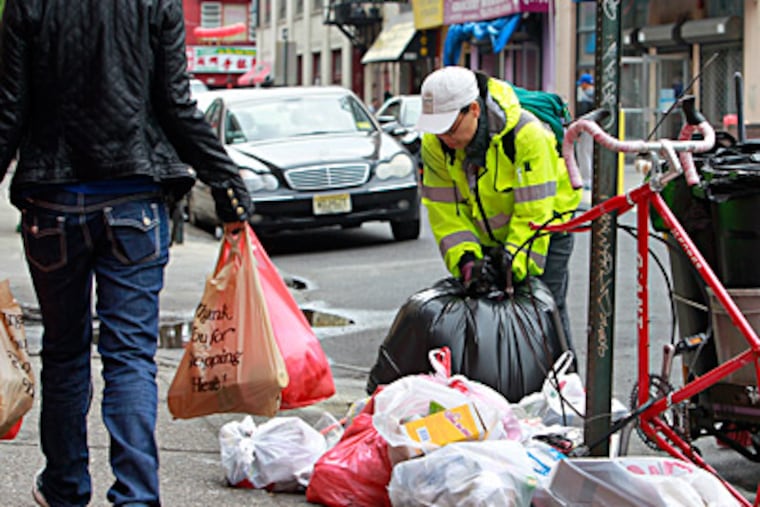A 'Dollar a Day' to keep Chinatown clean
The morning after the big Philly Spring Cleanup, the streets of Chinatown are tidy - but Susan Chung is trying to buff them to a high gloss.

The morning after the big Philly Spring Cleanup, the streets of Chinatown are tidy - but Susan Chung is trying to buff them to a high gloss.
She sweeps cigarette butts from a curb, digs a cup out of a concrete planter, then loads up a dozen red plastic bags, some of them spilling food and dripping liquid, that have materialized on the sidewalk.
Chung, armed with a broom, dustpan, and rolling trash cart, is a key part of the Philadelphia Chinatown Development Corp.'s new effort to beat back litter - an undertaking that seems to be working. She's one of three sweepers hired to patrol the neighborhood. The goal: to not only clean up after others, but also raise awareness and change behavior concerning litter.
"My friend goes, 'You are an army of one,' " said Chung, outfitted in purple work gloves, a white Adidas cap, and a yellow Day-Glo jacket bearing the PCDC logo. "I care about the cleanliness. I want to put myself out of a job. I can't walk past a wrapper without picking it up."
PCDC launched its "Dollar a Day" program in August, asking local restaurants and businesses to contribute - raising about $10,000. Some residents have kicked in, too. Those funds, together with a $59,000 city grant, pay for sweepers to conduct a daily cleanup and to cart off illegally dumped trash.
The goal is to create a healthier living environment and better business climate and to improve the perception of Chinatown, which for years has suffered a reputation of trash-strewn streets. During the last seven months, workers have swept the equivalent of 2,390 city blocks and collected 1,444 bags of trash.
"I think there's a striking difference," said PCDC Main Street manager Diana Lu. "Many businesses have reached out to me to join [and] to me this means that the results speak for themselves. ... Folks believe in what this program can do and are choosing to participate."
On Saturday, thousands of volunteers joined in the fifth annual citywide Spring Cleanup, bringing enthusiasm to an antilitter campaign that has drawn wide approval but failed to create lasting change.
The city "litter index" shows that many parts of Philadelphia have gotten dirtier. The number of "extremely" or "excessively" littered areas has grown from seven to 47 in four years - despite the harmful impact of litter on property values, health, commerce, and quality of life.
In 2011, the litter index rated Chinatown as "moderately littered," the second-best designation.
But that finding has not squared with perception or with the frequent on-the-ground reality. Trash has long been a contentious topic in Chinatown, a popular tourist destination but also a residential neighborhood.
Community leaders say one problem is many residents are used to the once-a-day pickup they knew in China. Keeping trash inside all week seems unsanitary. So people put full bags of trash outside, where they get kicked or ripped, their contents scattered.
Another issue is that many residents rent single rooms, without kitchens or refrigerators, leaving them to dine largely on take-out. The containers and uneaten food often end up on the curb.
The "Dollar a Day" program concentrates on the corridor of 10th and Race Streets, the heart of Chinatown. On Sunday, people were out early, as usual, shopping for groceries, chatting with friends, and pushing babies in strollers.
On the southwest corner of the intersection, a sidewalk vendor sold fresh greens and scallions. Another displayed his wares of sandals, stockings, and underwear on overturned plastic milk cartons.
Chung swept under the big neon sign of David's Mai Lai Wah Restaurant and Noodle House, a neighborhood mainstay, then worked her way west, broom and dustpan in hand. She reached a problem area near 11th and Cherry, a space defined by a vacant storefront, parking lot, and alley.
Beneath a sign saying "No Dumping - $300 fine," people had dumped plastic bags filled with trash.
Chung swept up the mess, then plucked a 55-gallon bag from her cart and began collecting the smaller bags. Whoever left the refuse was long gone. In fact, the pile may have started with only a couple of bags, then grown as people added more, eventually creating a heap.
Chung didn't know who was responsible, of course.
But when she's on duty, as she moves through the streets of Chinatown, she makes a point of talking with businesspeople and local residents about the importance of a clean neighborhood.
Trash on the sidewalk is a public-relations problem - no tourist or diner wants to step over piles to enter a restaurant. It's a health issue. It can even be a fire hazard.
"We're not doing it to be mean," Chung said of her outreach efforts. "We're doing it to educate, to make a safer community."
at 215-854-2415 or jgammage@phillynews.com,
or follow on Twitter @JeffGammage.